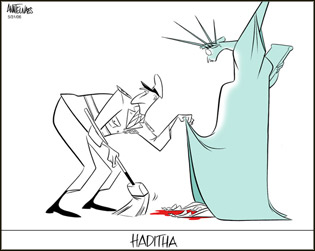Can There Be Democracy Without Women?
Curator Masum Momaya introduces "Democracy"
The Roman and Greek civilizations, viewed as modeling modern day democracies, placed men as central public figures, although women appeared influential as goddesses in their respective mythologies. Their counterparts in Africa, Asia and the Pacific are said to have placed real women, and not just goddesses, in positions of genuine power, although it's not evident that those roles have translated into gains in modern day polities. Recent history, including that of the last 500 years or so, tells us that women have played critical roles in bringing about modern-day democracies. So, can there truly be democracy without women?
Many root the concept of democracy to Greek civilization of the 5th century BCE. The word itself is comprised of "demos," meaning "people," and "kratos," which means "rule." Although there is no universally accepted definition of the word in contemporary times, there is a widely used litmus test for democracies which consists of two questions:
1. Do all members of society have access to power?
2. Do all members enjoy universally recognized freedoms and liberties?
Held to this strict test, it could be argued that no country in the world is a true democracy. Rarely do women, ethnic minorities, immigrants, sexual or religious minorities enjoy full access to power or liberties.
Even the ancient Greeks, long upheld as a model, were guilty: All male Athenian citizens were eligible to speak and vote in the Assembly, which set the laws of the city-state, but no political rights were granted to women or slaves.
Can there be democracy without the full participation of women or any other marginalized group?
When the symbols of democracy--a free press, a fair judicial system, accountable officials, competitive elections and human rights--are in danger or nowhere to be seen, it is women who pick up the pieces and push for reform .
Often at great risk to their lives, women stand up and speak out, refusing to accept that corrupt and unjust societies are acceptable. Women do the dirty work of unearthing corruption and crime. Some speak out again and again , in multiple forms, until they are heard and the powers that be are held accountable. Others try to create some order and support amidst war and conflict. And when violence is over, women initiate reconciliation and model forgiveness .
Freedoms are fragile, but women are resilient. Women's full participation in democracies is unquestionable indicator that the people do, indeed, rule.
Explore all the stories in this theme.


